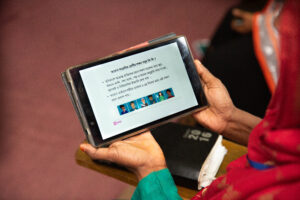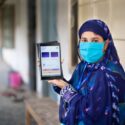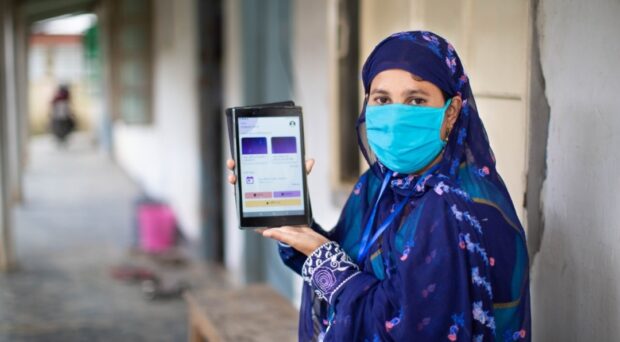Shasthya Koromis, community health worker/health care provider, uses Dishari to share the latest information about COVID-19 in her community.
Image credit: Abdullah Al Kafi
CHWs routinely deliver essential healthcare and health education to people’s doorsteps. They are the first line of care in many resource-limited settings, leveraging their experience and local knowledge. CHW interventions contribute to reductions in child marriage, maternal mortality and neonatal deaths as well as an increase in diabetes self-management and family planning in all countries.
Facing an unprecedented COVID-19 outbreak, CHWs around the world have been forced to rethink how they deliver primary health care and also become a trusted source of information in uncertain times.
The Shasthya Kormis – a group of CHWs with experience in BRAC is a large non-governmental organization based in Bangladesh. – were no different. These 4,500 SKs, armed with basic training and an Android tablet as well as primary screening tools for non-communicable diseases, frequently visit homes and connect them with healthcare institutions via public hospitals of their region. In order to control the spread of COVID-19 by mid-2020, the Bangladeshi community would have limited access to institutional healthcare. They were counting on the support of the SKs more than ever. Many SKs said rumors, misinformation and risk awareness were necessary to combat the spread of COVID-19 in Bangladesh by mid-2020.
To resolve this issue, SKs had to frequently learn and adapt to new protocols and support methods. SKs could no longer rely as much on group sessions or in-person training to stay up to date with the latest information, especially as lockdowns continued to be implemented across Bangladesh.

Shasthya Kormis/Community Health Worker using Dishari as a distance learning platform
Image credit: Abdullah Al Kafi
The BRAC Health Program in collaboration with a group from Shahjalal University of Science and Technology in Sylhet, Bangladesh, launched the Dishari distance learning platform. It is designed to help train SKs to raise awareness about COVID-19 and combat any misinformation in the community.
The project team, taking into account the background of SKs, who have limited digital literacy due to their regular use of Android tablets, designed a lightweight Android application with a simple Bangla interface, avoiding the need for typing a long time. The lessons consisted mainly of short videos and images, while the exams consisted of multiple choice questions. To ensure the most up-to-date advice was provided, senior health program doctors were consulted. A component of the system was integrated to assess the level of knowledge of each SK. He then guided the SKs accordingly. A supervisor dashboard compiled data and sent messages about users' learning performance.
Although it was initially difficult for the developers and the project team to collaborate remotely, collaboration tools helped overcome this challenge. The application prototypes were tested in two different locations, Dhaka (urban environment) and Khulna (rural environment). To prepare, branch training sessions were held with participants and trainers adhering to strict safety and social protocols. Area managers supervised the training and installed the tablet application for each participant. The sector managers accompanied the participants throughout the course and then the exam. Participants completed a second set of exams and courses independently after reviewing the problem-solving process in the app. Participants then shared feedback on the first version of the app and undertook a second round of at-home training.
Initial testing showed promising results for participating SKs, who demonstrated high knowledge retention after using Dishari. In focus groups, participants said Dishari was easy to use and improved their health knowledge.
After the app was launched on the Google Play Store in June 2020, it was used to successfully train SKs working in BRAC's first comprehensive COVID-19 response project in Gazipur, Bangladesh, which took a direct impact on 300,000 people.
Using distance learning platforms is a great way to quickly equip health workers with knowledge and skills in the event of an outbreak or pandemic. This also ensures that essential health workers undergo ongoing training. Dishari was recently integrated into the BRAC health program to continue building the capacity of 3,685 health workers in 51 districts serving a population of over 58 million.



